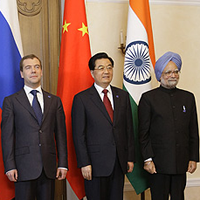Much has been written about the potential impact that the demise of Osama bin Laden and the possible disintegration of al-Qaida will have on U.S. foreign policy, beginning with the question of whether this will trigger a more rapid disengagement from Afghanistan. But bin Laden's death could also change the foreign policy calculus of other states, notably Russia, which for the past 10 years has promulgated its own version of the global war on terror as a central organizing principle for international affairs.
Even before the Sept. 11 attacks, Moscow had already seen bin Laden as a threat to the interests of a disparate group of major powers and proposed that a coalition of states be prepared to take action against al-Qaida. After Sept. 11, "cooperation in the war on terror" became a major plank in Russia's case for its relationships with the United States, Europe, China and India. It also became the organizing principle for subsuming the various insurgencies in the North Caucasus, notably in Chechnya, under the banner of the global struggle against Islamist extremism and terrorism worldwide. Bin Laden's departure from the global scene and the potential unraveling of al-Qaida into smaller, disconnected terrorist franchises now calls these assumptions into question.
The impact could be felt in a number of ways. To begin with, it increases the probability that the international community will once again delink the Caucasian insurgencies, and the terrorist acts they have engendered in other parts of Russia, from the broader scourge of international terrorism. The tacit bargain made by the Bush administration in the months after Sept. 11 allowed Russia to "include" Chechen attacks as part and parcel of al-Qaida's global campaign. Prior to Sept. 11, Moscow had found itself coming under increasing pressure from both the U.S. and Europe to negotiate with the separatists in this region and to accommodate their demands.

